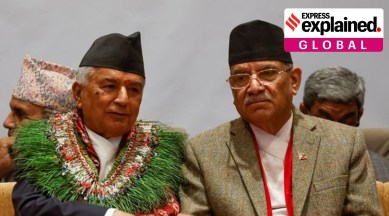As Nepal elects Ram Chandra Poudel as President, a look at how he rose to power
Before being elected as the President, Ram Chandra Poudel served as Nepal's Deputy Prime Minister, cabinet minister, and Speaker. His election comes amid political turmoil in the country.

In an election overshadowed by political instability, Nepal elected Ram Chandra Poudel as its President Thursday (March 9).
With the vote of 214 lawmakers of Parliament and 352 provincial assembly members, Poudel, 78, secured a comfortable victory over rival Subas Chandra Nebmang. The total number of voters for the election of the President is 882, consisting of 332 Members of the Parliament and 550 members of the provincial assemblies of the seven provinces.
The Prime Minister’s decision prompted the pro-monarchy Rastriya Prajatantra Party (RPP) to pull out of the Cabinet and announce withdrawal of support to the government.
How powerful is Nepal’s president?
This is the third presidential election in Nepal since the country became a republic in 2008. The tenure of the current president, Bidya Devi Bhandari, will end on March 12. The term of office of the President is five years from the date of election, and one individual can be elected to the post for only two terms.
Although the post of President is largely ceremonial, they hold some discretionary powers accorded by the Constitution.
Who is Ram Chandra Poudel?
Before being elected as the President, Ram Chandra Poudel served as Nepal’s Deputy Prime Minister, cabinet minister, and Speaker. He spent years of his life fighting for democracy in the country.
Poudel was born on October 14, 1944 in Bahunpokhari in a middle-class farmers’ family. He holds a Masters’ Degree in Arts with Nepali language as major subject.
As reported by the Press Trust of India, Poudel joined politics at the age of 16. He became the founding central member of Nepal Students’ Union, the student wing of Nepali Congress, in 1970.
Poudel was appointed Vice president of the Nepali Congress Tanhu district committee in 1980, and rose to become General Secretary in 2005, Vice President in 2007 and acting president of the party in 2015.
He played an active role in the Satyagraha of 1985, People’s Movement part I of 1990 and People’s Movement part II of 2006. He spent 12 years in jail fighting against the autocratic Panchayat regime, which was in place from 1961 to 1990 and concentrated all powers in the hands of the King.
Poudel was elected to the House of Representatives from Tanhu district for the first time in 1991. Thereafter, he represented Tanhu for six consecutive terms.
He was appointed Minister for Local Development in May 1991 and became Agriculture Minister in 1992. Poudel served as Speaker from December 1994 to March 1999. He served as Deputy Prime Minister and Minister for Home and Minister for Information and Communication from 1999 to 2002.
Poudel also served as Deputy Prime Minister and Minister for Peace and Reconstruction from 2007 to 2008. He was elected Parliamentary Party leader of Nepali Congress and leader of the main Opposition in Parliament from 2008 to 2013.
In 2020, he was honoured with the Grand Cordon of the Order of the Rising Sun from Japan, for his role in strengthening Nepal-Japan ties.
He has authored over a dozen books about democracy, socialism and agriculture. Poudel is married to Sabita Poudel, and they have four daughters and a son.
With inputs from PTI